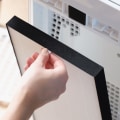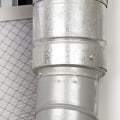The short answer is that it can, but it's not really a problem except in extreme circumstances. Most modern HVAC systems have no problem working with Merv filters, so millions of homeowners rely on them. The main risk of high-efficiency air filters comes from the fact that they are not modified for long periods of time. If you're aware of changing filters, you're unlikely to experience filter-related issues with your HVAC system.
Usually, a filter with a higher Merv rating will reduce airflow. However, there are many other factors at play, such as the size of the filter and the type of fan motor in your HVAC system. Using an air filter with a MERV rating that is too high is as bad as using one that is too low. Air filters with higher Merv ratings may filter more, but the thickness of the filter material may restrict airflow. Restricted airflow can decrease comfort, increase energy use, and accelerate wear of HVAC components.
In particular, using an air filter with a too high MERV rating can damage the compressor, heat exchanger, and air conditioner coil. A MERV rating is a good indicator of the effectiveness of an air filter in your central HVAC split system. The higher the rating, the better the filter. As the MERV rating increases, fewer and fewer contaminants and dust pass through the filter, improving the quality of the incoming airflow. Studies have shown that using an air filter with a MERV rating of 12 or higher can reduce energy consumption by up to 20%.
They also found that airflow in high-MERV filters dropped by 7% and 11% in the two HVAC systems compared to low-MERV filters. Similarly, the medium MERV filters also showed decreased airflow relative to the low MERV filters, this time 3% and 8% lower in both systems. The AC coil inside or near your furnace or air handler gets very cold as it draws heat out of the space and pumps it out. A normal flow of warm air over the coil will prevent its surface from falling below 32F. Low airflow allows coil to freeze cool.
Then the moisture in the air freezes and the coil is covered with ice. At that time, your air conditioning system can't do its job. The goal of using a MERV 12 or higher filter is a better IAQ: cleaner, more breathable air for everyone, and especially for those with allergies, asthma, COPD, etc. If you are in a situation where you should not use a high MERV (12+) filter for your oven or air conditioner and would like to research air purifiers, here are two suggestions. The same goes for households with smokers or pets, as Merv 11 air filters are better at eliminating odors. The MERV scale is not linear; the difference between a MERV 6 and a MERV 8 is almost double in the percentage of particles captured.
Once a filter begins to filter these small particles (0.3 — 1.0 microns), it is at a level of approximately MERV 13. Low-efficiency filters are typically found within MERV 1-4 and high-efficiency filters are MERV 13 and more. The MERV rating tells you how efficient the air filter is at filtering particles of certain sizes. If you want you to at least clean your air and handle dust, mold, pollen and bacteria, then a MERV 8 will do the job. If your home's HVAC system isn't capable of handling MERV 13, opt for a filter with the next highest possible rating. I would like more companies to push for the installation of Magnehelic pressure gauges and gauges, as well as simplistic information brochures explaining why jumping into a MERV 13 from a 50 micron filter can be problematic, or letting a filter double its depth due to dust accumulation (I saw it, like a handyman, the furnace still it worked (more or less).
Owning pets would require a MERV 10 to control their dander, which tends to have smaller particles than the contaminants discussed above. MERV was designed by the American Society of Heating, Refrigeration and Air Conditioning Engineers (ASHRAE) to evaluate the effectiveness of air filters. Generally speaking, anything under a Merv 13 air filter should provide very efficient air purification in a house without affecting airflow.






